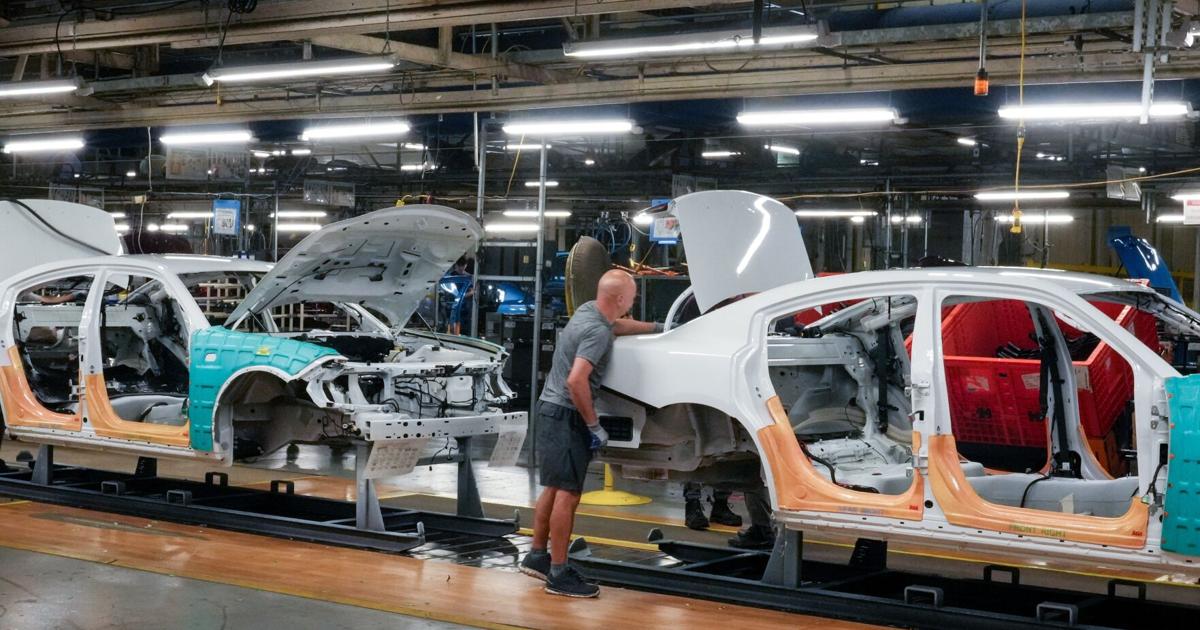Canada’s automotive heartland is reeling a day after Stellantis delivered a blow to hopes it will restart its assembly plant in Brampton.
”I am very concerned, very concerned for the future of the auto industry in Ontario,” said Oshawa Mayor Dan Carter Wednesday.
On Tuesday, Stellantis announced a $13-billion U.S. manufacturing expansion, and is moving production of its popular Jeep Compass from Brampton to Illinois.
The move comes amid a growing trade war sparked by U.S. President Donald Trump’s tariffs.
While Carter says he has a strong relationship with General Motors, which has a major presence in his city, the Stellantis news was “very disappointing.”
He suggested it’s not a coincidence that the Stellantis news comes just a week after U.S. commerce secretary Howard Lutnick said Canada should be prepared to come second in automaking.
“What I am most concerned by is Lutnick’s comments,” said Carter. “They were really derogatory. … And we don’t know exactly what that will look like in regards to the ripple effect.”
And, Carter stressed, hitting auto assembly in Canada will harm the U.S economy just as much as it harms Canada, Carter warned.
“It seems like the Americans are making decisions that are going to impact the auto industry significantly in Ontario and I think it’s going to be detrimental to Canada, Ontario and the United States,” said Carter.
Windsor Mayor Drew Dilkens, whose city is home to a Stellantis van assembly plant, said the company’s decision was clearly aimed at placating Trump.
“I think all of the (automakers) are looking at how to put a few sprinkles on the president’s cupcake,” said Dilkens, adding that it’s a balancing act.
“They need to figure out how to give him the political wins that he’s so desperately seeking, while not entirely disrupting the investments that they’ve made in the supply chains,” said Dilkens, who also noted that Stellantis recently said it would be adding a third shift to the Windsor assembly plant.
Companies are struggling to figure out how to best invest their money amidst a trade war showing no signs of abating.
“This uncertainty creates a whole life of its own,” said Dilkens, “which is bad for business, bad for workers, bad for communities, and not even good for consumers. It’s not like this is helping consumers save money on the price of a vehicle.”
A furious Ontario Premier Doug Ford also slammed Stellantis’s decision.
Ford said he “had a conversation with the president of Stellantis” on Tuesday about the situation in Brampton.
“He said, ‘Well, we’re going to postpone it for a year, we’re going to find a new model (for the Brampton factory),’” Ford recounted Wednesday of their chat.
The premier said the auto giant told him 1,500 of the 3,000 Brampton jobs in jeopardy could move to Windsor where Stellantis is building an EV factory.
But Ford, who along with Ottawa has committed billions in production tax credits to Stellantis, warned the company that it needs to hold up its end of the deal.
“I’m not going to give them a penny because it was tied in to making sure Windsor and Brampton keep going. And we haven’t given them a penny for Brampton yet,” he said, noting he will be meeting privately with Prime Minister Mark Carney on Thursday in Toronto.
“We gave about $55 million out of the couple billion that the feds and I and the companies agreed.”
At Queen’s Park, NDP Leader Marit Stiles said Ford’s blustery rhetoric is small comfort for out-of-work Ontarians.
“Doug Ford is a jobs disaster,” said Stiles. “That company made a promise to Ontario workers …. and it’s just like everything else we’ve seen in the auto sector, it’s shock after shock after shock.”
In statement via text, the head of the Ontario Chamber of Commerce said hitting one part of the highly-integrated North American automotive industry risks disrupting it all.
“The only thing that’s clear is that Trump’s tariff policies are toxic to the highly integrated North American auto industry,” said Daniel Tisch. “The egg can’t be unscrambled. The sooner that Canada, the U.S. and Mexico recommit to integration and collaboration, the brighter the future will be for everyone.”
In North America’s highly-integrated automotive supply chain, raw materials and parts cross the border up to seven times en route to becoming a finished vehicle.
The Stellantis news could be just one of many shoes to drop and risks doing permanent damage to the Ontario and Canadian economy, warned the head of the Toronto Region Board of Trade.
“Yesterday’s announcement … is a worrying demonstration that we are rapidly losing critical mass in a foundational sector of Ontario’s economy,” said CEO Giles Gherson. “There could be more shoes dropping as our manufacturers shift production south of the border and increasingly use U.S. steel in auto parts. … America First is already inflicting significant damage to auto and steel sectors, threatening a permanent drop in Canada’s GDP.”
In a video address to a Canada-U.S. trade conference last week, Lutnick bluntly said Canada must settle for coming “second” to the U.S. in the automotive industry.
“Car assembly is going to be in America, and there is nothing Canada can do about it. The question is, what is Canada going to do instead?” one source quoted Lutnick as saying at the conference, which was held under the “Chatham House Rule” that bars reporters and media coverage.
With files from Robert Benzie and Tonda MacCharles



